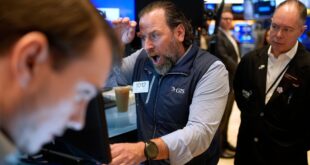Google’s EMEA President, Matt Brittin has seen over 50% of the planet gain access to the internet. Here are his takeaways from his time at the top.
A recent Google report found that generative AI could add between €1.2 – €1.4tn to the EU’s GDP within a decade.
As well as the financial gain, Google’s outgoing EMEA President, Matt Brittin is excited about its capacity to “change people’s lives for the better.”
After 10 years as President and 18 years in total at Google, Matt is stepping down. He reflected on his time at the top with Hannah Brown on this episode of The Big Question and discussed some of the biggest and most exciting opportunities AI could bring.
What are the greatest AI opportunities for Europe?
When Matt was first appointed as President, he was given a report that said in the EU “a million jobs are going to be unfilled because of a lack of digital skills”.
Since then, Google has trained around 14 million Europeans in digital skills who have gone on to grow in their career, get a new job or start a business.
“If you think about AI a bit like electricity, we don’t need everybody to work in power stations, but we do need everybody to be able to safely use electricity to improve their lives,” Matt explained.
While AI skills can benefit an individual’s career, Matt is also particularly excited about the developments AI can offer in the health and energy sectors as a whole.
“The challenge with nuclear fusion is that you’ve got to have a plasma field stabilised by a magnetic field to sustain the reaction so you can harness the energy. That’s hard to do because they’re very, very unstable and hard to predict.
“But what’s AI good at? It’s good at spotting patterns, making predictions and learning.
“So applying that to plasma fields, actually you can start to stabilise them for longer and we’re starting to see some breakthroughs there now. I’m not saying that’s going to be tomorrow, but imagine clean, low cost energy for everyone.
“That’s the dream.”
Is Quantum Computing the next revolution after AI?
While the concept of quantum computing might feel inaccessible to those of us not in tech, Matt helped to explain it simply.
“Classical computing, they work on ones and zeros.
“Quantum computing uses qubits and there’s a thing called superposition, which means that you can be both one and zero at the same time. What that means is you can calculate many, many more possibilities than you would do with the sort of normal binary computer.
“And there’s a second thing, which is that two qubits can synchronise themselves across space so that you can coordinate calculations as well.”
So what does this actually mean?
Well, Google’s new Willow quantum chip is capable of doing a task in 5 minutes that a normal computer would do in a septillion years. That’s 1,000,000,000,000,000,000,000,000 years – longer than the universe has been in existence and frankly, an incomprehensibly big number.
Matt thinks this could have great applications for material development, understanding biology and further breakthroughs in healthcare.
What’s Google President’s favourite tool?
Despite all the very hi-tech work going on at Google, including DeepMind’s Nobel Prize winning protein structure database, Matt is still very passionate about the simple but mighty Google Translate.
“I feel like my Google career went in parallel with Translate.
“When we began Google Translate in 2006, we took EU texts and said, the best translators in the world have translated this document in English, German, Spanish etc. We used that to train this mystical model.
“Now we can learn languages like a child from the language on its own using A.I. and that’s what’s helping us bring more and more languages online,” Matt told The Big Question.
In fact, Google recently launched 15 new languages in Africa, giving more than 300 million people access to content in their own language, using AI.
“We’re used to being able to access the web in multiple European languages, but there’s still a thousand languages which can’t do that.
“At the heart of our mission is to organise the world’s information for everyone. And not everyone yet has that. So we’ve still got work to do.
The Big Questionis a series from Euronews Business where we sit down with industry leaders and experts to discuss some of the most important topics on today’s agenda.
Watch the video above for the full episode with Google’s Matt Brittin.
 top naija news Stay informed with the latest Nigerian news at your fingertips
top naija news Stay informed with the latest Nigerian news at your fingertips
